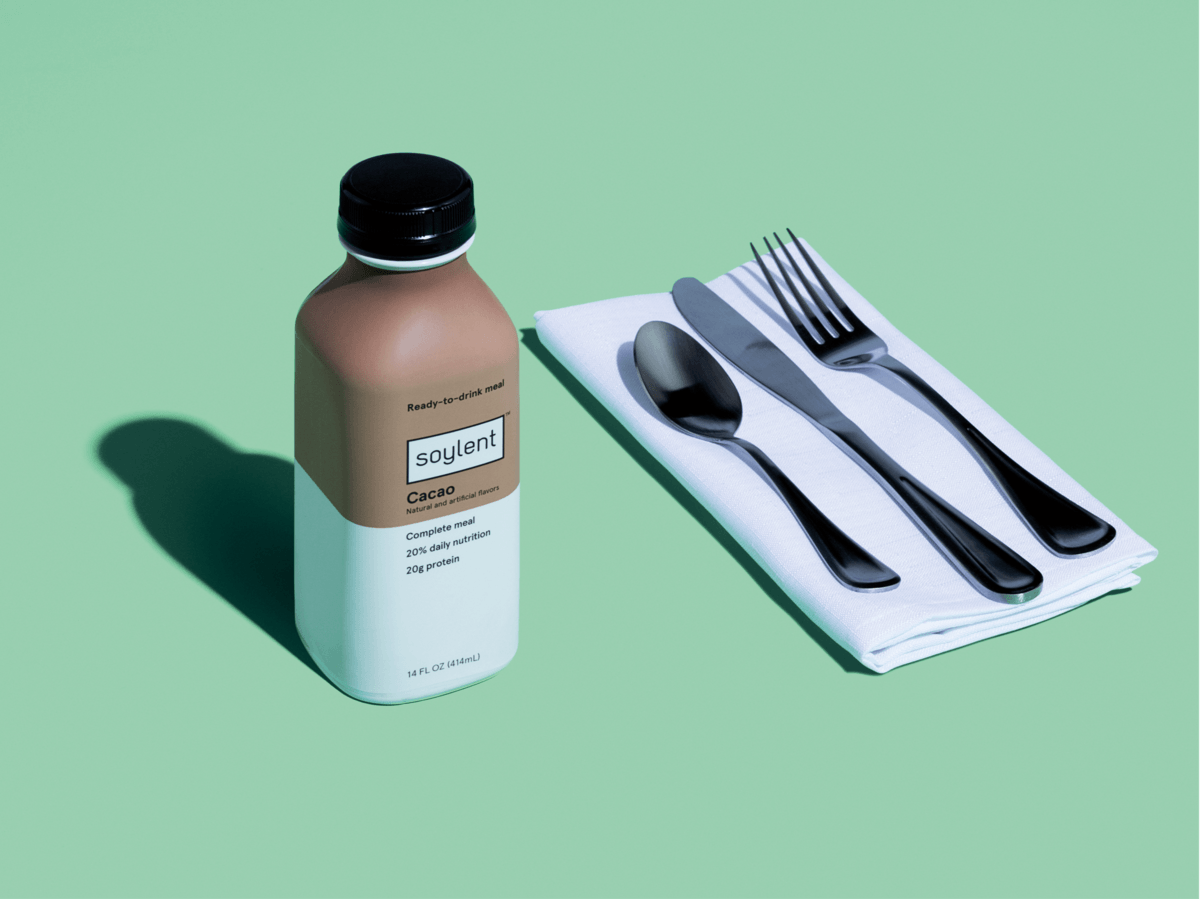Meal replacement drink maker Soylent is hopping across the pond to bring three of its beverage flavors to the UK in a move that requires the drink maker to re-think its sourcing. The vegan and nut-free drink uses plant-based protein to create a drink with all the nutrients necessary in a meal.
In 2016, the brand came out as pro-GMO, citing the rising global demand for food as the leading reason for its decision to embrace the divisive technology. Unlike the US, however, the UK has a strict ban on the cultivation of genetically modified crops within its borders, which will reportedly remain in place following Brexit.
“Before launching in the UK, we worked with the UK Food Standards Agency to ensure UK compliance. We’ve replaced seven GM ingredients from our US formula with the same unique, identity-preserved non-GM ingredients allowed under UK regulations,” says Andrew Thomas VP of marketing who is due to talk about the UK launch at the Future Food-Tech conference in London later this month.
“There is one ingredient in our UK formulation that is genetically modified — Soy Protein Isolate. It’s on a list of approved strains/”events” for the EU.”
Soylent selected soy protein isolate for the protein component of its recipe due to the ingredient’s bioavailability, which refers to how easy it is for the body to digest something. It also provides a consistent texture and achieves the company’s desired flavor profile, according to Thomas.
Soy protein isolate is nothing new to product formulations. It is a dry powder ingredient that has been isolated from other components of the soybean, leaving 90% to 95% protein in the resulting powder. A simple investigation of product labels at the supermarket will reveal the ingredients in everything from dairy products to fruit drinks to baked goods and cereals.
Why UK?
The company’s decision to launch in the UK may have something to do with the country’s reportedly overworked and hungry workforce.
The product will be sold in cases of 12 at £39.99, with each drink designed as a complete meal, packed with 20g of protein and 26 vitamins and minerals.
In preparation for the UK launch, the company engaged in extensive consumer research that showed UK consumers on average skip as many as four meals each week. It also revealed that over half of tech sector employees don’t eat breakfast. These results combined with the company’s impression that UK consumers are becoming more and more health conscious made the region the next logical step in its expansion.
“A 2016 study from Harris Interactive shows that nearly 60% of people living in the UK are skipping meals or snacking throughout the day. Soylent is a great solution for people who are always on-the-go, stuck at their desk during lunch, or just looking for an easy way to get the nutrition they need when they don’t have time for a complete, nutritious meal,” said Thomas. Thomas will be speaking on a panel entitled Nutrition & Health: Innovating to Enhance Performance, Flavour, and Texture at Future Food Tech on October 18, 2018 at Future Food-Tech.
Marketing
As part of its overall marketing strategy, the company has reassured consumers that it doesn’t intend to totally replace a diet containing fresh, traditional food.
“The truth is, we love food! It is connected to the fabric of what defines cultures and makes us human. We just think that nutrition shouldn’t be difficult. We also acknowledge that locally grown, fresh food is not available to everyone at all times, and we want to provide complete, sustainable nutrition to people and places where freshly grown food is not available or affordable,” adds Thomas.
It’s also relied on its early cult following in the tech world and a direct-to-consumer approach to convince consumers that a drinkable meal replacement is worth trying. Maintaining a presence on social communities like Reddit, Facebook, and Twitter have been a priority for Soylent, which allows it to have open communication with its existing and potential consumers.
Filling Food Voids
Soylent launched in 2013 and is the brainchild of four co-founders who wanted to find a solution to the food voids they faced when launching their own startup businesses. Working under the same roof and eating the same diet of frozen corn dogs and instant ramen noodles, the team came together to develop the first Soylent formula.
“The Soylent vision is to change the way the world thinks about food. One of the ways we hope to achieve that vision is by eliminating unhealthy, unsustainable and expensive “‘food voids,’ and to do so everywhere. Many of us, both in the US and the UK, lead very busy lifestyles, which often lead to these ‘food voids’, which are those times when you either skip a meal or turn to junk food and takeaway,” says Thomas.
After an initial crowdfunding campaign, which achieved what the company says was the highest number of pre-orders for a food and beverage product via crowdfunding to date, Soylent went from one mixable powder sold direct to consumers to a suite of ready-to-drink meals. As of 2015, the company was reportedly valued at $100 million.
The company has raised over $72 million in venture capital funding, with its most recent Series B raise bringing in $50 million of capital in 2017. The round was led by GV, the investment arm of Google, with participation from Tao Capital Partners, Lerer Hippeau, and Andreessen Horowitz.
Expansion
The brand has continued to expand and is now available on Amazon and stocked with US retail giants like WalMart, 7-11, and Kroger. The company reports landing in first place on Amazon’s US Grocery product list in January 2018.
“Soylent is hugely popular in the US with busy professionals, students, gamers – people who have a lot on their plate. Our target UK consumer is similar — they’re people looking for simple, on-the-go choices that aren’t a bag of crisps or an expensive boxed salad. UK consumers are conscious of wanting to be healthier and more productive at work and at home, so we’re confident these consumers will be eager to try Soylent,” explains Thomas.
Snagging UK market share is Soylent’s priority for the rest of 2018, with a powdered version of the drink product set to hit the UK in 2019.
“We do have a few other exciting developments in the works, but we’re not quite ready to share the news on those just yet!”





